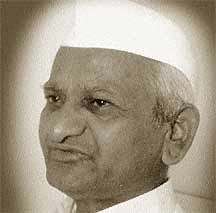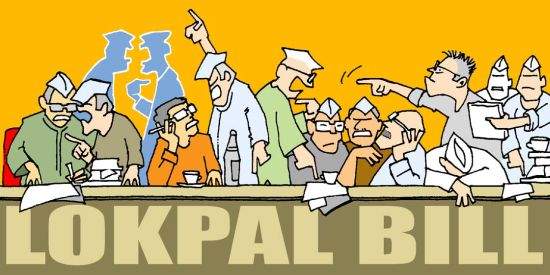by Bijesh Krishnadas
[box]
Jan Lokpal. Corruption. Anna Hazare. If you are in India, then there is absolutely no chance that you wouldn’t have run into these words. The media has dissected this issue enough – but the irony is that the pro-Jan Lokpal team is yet to realize its demands. Bijesh Krishnadas shares his thoughts on this much-discussed topic in India today and tells you why Jan Lokpal is needed despite the many questions raised about the possibility of the body ridding the Indian system of corruption. Read on.[/box]
Hearing the phrase “Jan Lokpal” – perhaps the most heard these days as far as Indian current affairs are concerned – appears to bring extreme reactions amongst people in India. There is the “for” camp that thinks of this as a revolution of sorts resembling the protests that took the Middle-East/Mediterranean region by storm. This side of the argument appears to be staunchly supported by those in the limelight – actors, artists, etc., and techies that have taken to social networking in a big way. On the other side is the “against” camp that considers the Lokpal a parallel government that would steamroll parliamentary democracy. I have noticed that the against side appears to be composed of non-conformists and surprisingly, the ones that are disgruntled with the system. Yes, the same ones that crib about the system are now up in arms against change to that system.
The revolution comparison is a bit far-fetched, in my opinion. The ground reality in India is that things are not as bleak as in countries like Egypt and Tunisia. Those countries were suffering under tyrannical hands and it was almost a do-or-die for the citizens. India, on the other hand, in spite of all its flaws, is a democracy and a pretty well-guarded democracy at that. There isn’t enough motivation yet for the twitterati to leave their cushy abodes and camp out in a suitable Tahrir Square.
There is no denying the fact that this movement of sorts, particularly after Anna Hazare shot to limelight with his fast, did bring together – for a brief period of time – a very large section of the Indian population and allowed them to voice their dissent and anger at the corruption prevalent in our bureaucracy. In doing so, it has shown that if push comes to shove, there is a way to mobilise and co-ordinate a more involved “movement”. Yet, it comes nowhere close to becoming a revolution or an uprising. For most of the participating middle class, it was a case of mass hysteria than a commitment to change.
All the same, revolution or not, my support does lie with those working towards the Jan Lokpal. Not because I think it will cure India of all its ills, but because it can impose a certain amount of accountability on the bureaucracy. I agree that corruption is not limited to the politicians and extends to the civil society as well. However, that doesn’t take away from the fact that a start has to be made – and where better to start than at the top? After all, aren’t the government and the bureaucracy responsible for running the country?
I am yet to fully understand the arguments that the “against” camp puts forward. On one hand, most of them have always lamented the rampant corruption. On the other, they don’t favour the installation of an independent body with powers to stop corruption! Some of them also hold to the pessimistic view that introducing the Lokpal will change nothing and that India is beyond redemption. Even so, how would we know what changes the body will bring unless we give it a chance?
This camp uses such phrases as “undemocratic” and “dictatorship” to describe the Jan Lokpal. Yes, the Jan Lokpal – as envisioned by the civil version – has unprecedented authority to investigate individuals but who can deny the fact that ultimately, the power to convict or not still lies with the Justice system? How then can the Lokpal be called undemocratic? What is so wrong in holding elected representatives responsible and accountable for their own actions? Even the constitution does not provide politicians immunity from the law, then what exactly is the issue here?
One of the commonly used arguments against the Lokpal is that it will not solve the problem of corruption but will only serve to push it underground. This is the same old il-logic applied to restrictions on drug use. Keeping aside all the issues of choice, hasn’t making drugs illegal kept it out of many hands? Of course, it is a given that the LokPal is not a fix-all but it is a start. Yet, by pushing corruption underground, it will also make it that much more difficult. Politicians and bureaucrats will think twice before soliciting a bribe.
The Lokayukta office in Karnataka is a shining preview of what can be achieved through a Lokpal organisation – the only grudge that remains is that it could be given more power. The Lokayukta’s helpline is a boon to the common man. A simple threat to involve the Lokayukta has helped many avoid paying hefty bribes to get things done.
On a larger scale, although the Lokayukta has submitted reams and reams of well-investigated and well-substantiated reports on corruption in the bureaucracy, the state government has not taken any action against the guilty. Inspite of the evidence against them, the corrupt still walk free.
This being the case, the Jan Lokpal, if it becomes a reality, will be a Lokpal without a handicap and more power — an investigation agency that can initiate investigations without requiring permission to do so from the government – an agency that can file cases against the suspect, if it has enough evidence. Not a dictatorship, not a juggernaut. Whether it will see the light of the day, one will have to only wait and watch.
Bijesh Krishnadas works as an Engineering Specialist (fancy name, same game). His list of interests has seen the likes of the guitar (still can’t play), motorcycling (misses it now), photography (rekindling in progress) and dabbling in writing. He also likes to cook fancy meals with nice, long names but doesn’t do that very often.
[facebook]Share[/facebook] [retweet]Tweet[/retweet]
[button link=”https://sparkthemagazine.com/wp-content/uploads/2011/08/Spark-August-2011.pdf” newwindow=”yes”] Click here to download the August 2011 issue as a PDF[/button] [button link=”http://issuu.com/sparkeditor/docs/spark-august-2011?mode=embed&layout=http%3A%2F%2Fskin.issuu.com%2Fv%2Fcolor%2Flayout.xml&backgroundColor=000000&showFlipBtn=true” color=”green” newwindow=”yes”] Click here to read the August 2011 issue like a magazine[/button]








Siva,
Thanks for your compliments.
The unfortunate fact is that there is a large chunk of people in India that have given up. I only wish that this sub-section didn’t hinder the good work (not just in this LokPal debate) that a lot of the “aam junta” are doing. The important thing is to remember that the LokPal is not a fix-all but it’s a good start.
Bijesh,
Very candid analysis of the on goings. The issue could not have been explained any better than this from a common man’s perspective. Wish all the honest people fell behind Anna to make it happen!!